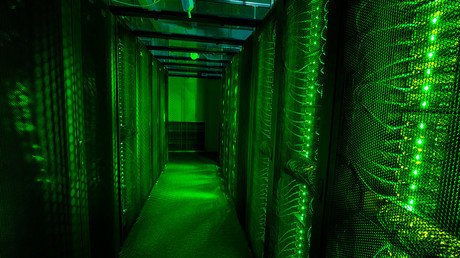MIT’s new quantum computer could render today’s encryption useless

Researchers at the Massachusetts Institute of Technology have created the first scalable quantum computer that could make current data encryption methods obsolete with its ability to factor very large numbers. The new device uses only five atoms.
In a paper published Friday in the journal Science, researchers from MIT and Austria’s University of Innsbruck said that they devised a working quantum computer that runs on just five atoms in an ion trap.
The difficulty of breaking encryption with contemporary technology was exhibited in 2009, when researchers had to run hundreds of conventional computers nonstop to find the prime number factors of a 232-digit number. Quantum computers, however, could theoretically perform this task in an amount of time that is short enough to be actually workable.
“It might still cost an enormous amount of money to build – you won’t be building a quantum computer and putting it on your desktop anytime soon – but now it’s much more an engineering effort, and not a basic physics question,” said Isaac Chuang of MIT, who was part of the team that built the new quantum computer.
“In future generations, we foresee it being straightforwardly scalable, once the apparatus can trap more atoms and more laser beams can control the pulses,” Chuang continued. “We see no physical reason why that is not going to be in the cards.”
Present-day computers operate using traditional bits, which can only represent a value of 0 or 1. With this limitation, conventional computers can only try to pack more and more transistors in to get larger combinations of 0’s and 1’s. Having five bits, for example, is two to the fifth power, meaning that five bits can give us 32 different possible information states.
Quantum computers, however, use bit-alternatives known as “qubits” that can each have multiple binary values at the same time. So where traditional computers are stuck putting 0’s and 1’s together to have codes like 01, 11 or 00, qubits can have in a quantum computer system can have a “superposition” like 00-11, 10+00 or 11+00.
Thus, having five qubits could be, for example, five to the fifth power, blowing traditional computers out of the water with 3,125 possible information states – or theoretically much higher.
READ MORE: White House explored ways to bypass smartphone encryption – memo
With their quantum computer of only five qubits, MIT researchers managed to correctly find the prime factors for the number 15 – five and three. This might not seem like a big deal, since conventional computers can manage such a feat with ease. However, it’s an important real-world implementation of Shor’s algorithm, a quantum computing method that can theoretically break through even very strong RSA encryption.
"We show that Shor's algorithm, the most complex quantum algorithm known to date, is realizable in a way where, yes, all you have to do is go in the lab, apply more technology, and you should be able to make a bigger quantum computer," Chuang said.
The computer design is the first of its kind that can be scaled up to factor much more complicated numbers by using many more qubits. Since present-day encryption methods – which critical institutions such as banks and national security organizations use to stay secure – rely on the difficulty of factoring very large numbers, a scaled-up version of the MIT computer could render encryption as we know it obsolete.













